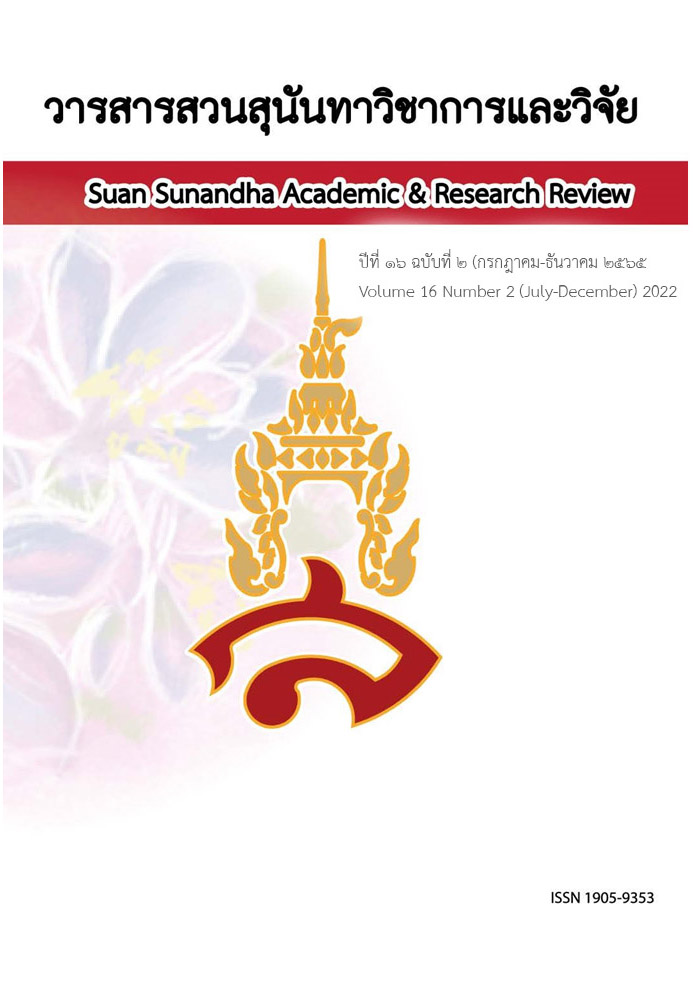โมเดลความรับผิดชอบต่อสังคมขององค์กรที่ส่งผลต่อประสิทธิภาพทางการเงิน ของธนาคารพาณิชย์ในประเทศไทย
คำสำคัญ:
ความรับผิดชอบต่อสังคมขององค์กร, ประสิทธิภาพทางการเงินบทคัดย่อ
การวิจัยครั้งนี้มีวัตถุประสงค์ 1) เพื่อศึกษาการดำเนินกิจกรรมความรับผิดชอบต่อสังคม 2) เพื่อศึกษาการดำเนินกิจกรรมความรับผิดชอบต่อสังคมขององค์กรที่มีอิทธิพลต่อผลกระทบจากการดำเนินกิจกรรมความรับผิดชอบต่อสังคมขององค์กร 3) ศึกษาการดำเนินกิจกรรมความรับผิดชอบต่อสังคมขององค์กรที่มีอิทธิพลต่อประสิทธิภาพทางการเงิน 4) เพื่อศึกษาผลกระทบจากการดำเนินกิจกรรมความรับผิดชอบต่อสังคมขององค์กรที่มีอิทธิพลต่อประสิทธิภาพทางการเงินและ 5) เพื่อวิเคราะห์ความสัมพันธ์เชิงสาเหตุของตัวแปรอิสระที่มีอิทธิพลต่อประสิทธิภาพทางการเงิน
การวิจัยครั้งนี้เป็นการวิจัยเชิงปริมาณ กลุ่มตัวอย่างที่ใช้ในการวิจัย คือผู้จัดการสาขาของธนาคารพาณิชย์ ในกรุงเทพมหานคร จำนวน 330 คน โดยใช้วิธีการสุ่มตัวอย่างแบบแบ่งเป็นชั้นภูมิตามสัดส่วน สถิติที่ใช้ในการวิเคราะห์ข้อมูลคือ การวิเคราะห์ถดถอยเชิงพหุ (Multiple Regression) การวิเคราะห์เส้นทาง (Path analysis) โดยทดสอบความสัมพันธ์ของตัวแปรในเชิงเหตุและผล
ผลการวิจัยพบว่า 1) ธนาคารมีการดำเนินกิจกรรมความรับผิดชอบต่อสังคมขององค์กรด้านชุมชนมากที่สุดรองลงมาคือ ด้านสิ่งแวดล้อม ด้านการศึกษา 2) ผลกระทบจากการดำเนินกิจกรรมความรับผิดชอบต่อสังคมด้านความจงรักภักดีของลูกค้าได้รับอิทธิพลจากการดำเนินกิจกรรมความรับผิดชอบต่อสังคมขององค์กรด้านสิทธิมนุษยชน ด้านวัฒนธรรม และด้านการศึกษา โดยตัวแปรเหล่านี้สามารถร่วมกันพยากรณ์ได้ร้อยละ 22 3) ประสิทธิภาพทางการเงินได้รับอิทธิพลจากการดำเนินกิจกรรมความรับผิดชอบต่อสังคมขององค์กรด้านสิทธิมนุษยชน ด้านวัฒนธรรม และด้านการศึกษา โดยตัวแปรเหล่านี้สามารถร่วมกันพยากรณ์ได้ร้อยละ 58 4) ประสิทธิภาพทางการเงินรับอิทธิพลจากผลกระทบจากการดำเนินกิจกรรมความรับผิดชอบต่อสังคมด้านความจงรักภักดีของลูกค้า โดยตัวแปรนี้สามารถพยากรณ์ได้ร้อยละ 30 และ 5) ประสิทธิภาพทางการเงินได้รับอิทธิพลในรูปที่เป็นตัวแปรสาเหตุทางตรงจากสิทธิมนุษยชนส่งผลมากที่สุด รองลงมาคือ ความจงรักภักดีของลูกค้า ส่วนการดำเนินกิจกรรมความรับผิดชอบต่อสังคมขององค์กรด้านวัฒนธรรมมีอิทธิพลมากที่สุดทั้งทางตรงและทางอ้อมต่อประสิทธิภาพทางการเงินโดยส่งผ่านตัวแปรความจงรักภักดีของลูกค้า
เอกสารอ้างอิง
Angelidis, J., Massetti, B., & Magee-Egan, P. (2008). Does Corporate Social Responsibility Orientation Vary by Position in the Organizational Hierarchy? Review of Business Spring.(23-32).
Carroll A. (1991). The Pyramid of Corporate Social Responsibility: Towards the Moral Management of Organizational Stakeholder. Business Horizons, 34(4), 39-49.
Carroll*, A. (2000). A Commentary and an Overview of Key Questions on Corporate Social Performance. Measurement Business & Society, 39(4), 466-78.
Fombrun, C., Gardberg, N., & Server, J. (2000). The Reputation Quotient: A Multi Stakeholder Measure of Corporate Reputation. The Journal of Brand Management, 7(4), 241-55.
Grove, H., Patelli, L., Victoravich, L. M., & Xu, P. (2011). Corporate governance and performance in the wake of the financial crisis: Evidence from US commercial banks. Corporate Governance: An International Review, 19(5), 418–436.
Jorgensen, A., & Knudsen, J. (2005). Sustainable Competitiveness in Global Value Chains The Copenhagen Centre for Corporate Social Responsibility.
Logsdon, J. M., & Yuthas, K. (2011). Corporate social performance, stakeholder orientation, and organizational moral development. Journal of Business Ethics, 213‐26.
McWilliams, A. (2001). Corporate Social Responsibility: A Theory of the Firm Perspective. Academy of Management Review, 26(1), 117-28.
Mehdi, K., & Sadaf, E. (2011). Investigation of the Corporate Social Responsibility (CSR) Dimension in Private Financial Institutes (Case Study: Two Iranian Private Banks). Interdisciplinary Journal of Contemporary Research in Business, 3(2), 1129-1141.
Nwankwo, G. O. (1991). Bank Management: Principles and Practice. Malthouse Press Limited, Lagos.
O'Brien, K. J. (1996). Rightful Resistance. World Politics, 49(1), 31-55.
Orlitzky, M., Schmidt, F., & Rynes, S. (2003). Corporate Social and Financial Performance: A Meta Analysis. Organization Studies, 24(3), 403-41.
Peterson, D. (2004). The Relationship between Perceptions of Corporate Citizenship and Organisational Commitment. Business & Society, 43(3), 296-319.
Pfau, M., Haigh, M., Sims, J., & Wigley, S. (2008). The Influence of Corporate Social Responsibility Campaigns on Public Opinion. Corporate Reputation Review, 11(2), 145-54.
Pivato, S., Misani, N., & Tencati, A. (2008). The Impact of Corporate Social Responsibility on Consumer Trust: The Case of Organic Food Business Ethics: A European Review. 17(1), 3-12.
Ravi, K., & Anupan, S. (2011). Corporate Social Responsibility: A Corporate Strategy for new business opportunities. Journal of business Ethics, Vol.4, 10-18.
Scholtens, B. (2009). Corporate social responsibility in the international banking industry. Journal of Business Ethics, 86(2), 159–175.
Tsoutsoura, M. (2004). Corporate Social Responsibility and Financial Performance Working Paper Series. University of California, Berkeley, P.7.
Weber M. (2008). The Business Case for Corporate Social Responsibility: A Company Level measurement Approach for CSR. European Management Journal, 26, 247-61.
Yamane, T. (1973). Statistics: An Introductory Analysis. London: John Weather Hill, Inc.
ดาวน์โหลด
เผยแพร่แล้ว
รูปแบบการอ้างอิง
ฉบับ
ประเภทบทความ
สัญญาอนุญาต
ลิขสิทธิ์ (c) 2022 สถาบันวิจัยและพัฒนา มหาวิทยาลัยราชภัฎสวนสุนันทา

อนุญาตภายใต้เงื่อนไข Creative Commons Attribution-NonCommercial-NoDerivatives 4.0 International License.
บทความที่ได้รับการตีพิมพ์เป็นลิขสิทธิ์ของ สถาบันวิจัยและพัฒนา มหาวิทยาลัยราชภัฎสวนสุนันทา
ข้อความที่ปรากฏในบทความแต่ละเรื่องในวารสารวิชาการเล่มนี้เป็นความคิดเห็นส่วนตัวของผู้เขียนแต่ละท่านไม่เกี่ยวข้องกับมหาวิทยาลัยราชภัฎสวนสุนันทา และคณาจารย์ท่านอื่นๆในมหาวิทยาลัยฯ แต่อย่างใด ความรับผิดชอบองค์ประกอบทั้งหมดของบทความแต่ละเรื่องเป็นของผู้เขียนแต่ละท่าน หากมีความผิดพลาดใดๆ ผู้เขียนแต่ละท่านจะรับผิดชอบบทความของตนเองแต่ผู้เดียว






